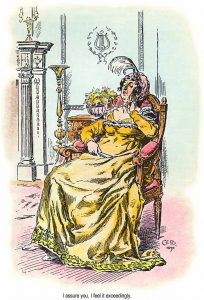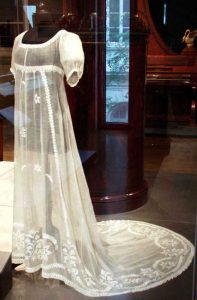
It was a refreshment, after the last troubled weeks, for Mr. and Mrs. Darcy to sit in the garden of the Palazzo Mocenigo and peacefully enjoy noticing the signs of an early spring. The ornamental garden, with its statues and flower beds, stretched from the back of the palace to the Grand Canal, where a terraced balcony overlooked the water. It was both enchanting and restful to watch all the different gondolas and other boats passing by as in a moving frieze, while the children played under the persimmon trees.
“I wonder what it is about Venice,” said Elizabeth thoughtfully, “that makes all the wickedness seem like a dream.”
“Do you mean that beauty is seductive, my dear?”
Elizabeth got up and strolled over to examine the camellia bushes that were in bud, and the trellis that soon would be overrun by tiny climbing white and pink roses. “That may be partly the case, but not entirely. Why do you think that the behavior of men as wicked as Wickham, and yes, Lord Byron, is scarcely seems noteworthy here? In England it would be a constant scandal.”

“Perhaps that is why they come here,” Darcy said practically, “to misbehave where there are no consequences. The Englishman in foreign parts is often a byword for misbehavior. Young gentlemen making their first Grand Tour often get up to trouble of a sort you don’t want to know about.”
“It would hardly surprise me, but how do you account for such seasoned libertines as his Lordship and our esteemed brother-in-law? They are no young cadets, to care what any body thinks.”
Darcy sighed. “I cannot explain it. But do not forget that the fault is not all on the side of the gentlemen.”
“I cannot forget my sister for one moment,” Lizzy admitted.
As if hearing the discussion, Lydia emerged from the direction of the Darcys’ bedroom, trailing one of Lizzy’s long silk robes, and her furred mules. “Isn’t there anything to eat?” she remarked. “It’s eleven o’clock. Surely there ought to be muffins?”
“Breakfast was finished long ago,” said Elizabeth with tight lips, “but you can tell Nurse Carson to have them serve us some coffee and cakes. And when you’ve done ordering that, please go and change out of my dressing gown and slippers; they are not meant to be worn in the grassy garden, they will be ruined with stains.”
Lydia sniffed. “What a fusspot you are. You know very well I have no night things of my own. Either Byron or Wickham have made dreadful rips in them, they are fit only for the rag-bag.”
“Well, tell Amelia to find you something plainer, that can be washed.”
“Oh, very well.” Lydia trailed back into the palazzo, the lace train dragging on the ground, and Elizabeth sat with her eyes downcast. After a moment, Darcy covered her hand with his. “Don’t be troubled, my love. We will soon be back in England, and Lydia will be gone to stay with her children at Longbourn.”
“I can’t deny that I will be glad to see the back of her. But then my father will be troubled.”
“It is his turn, you might say,” Darcy answered dryly. “We have borne the burden for far too long, to the point of heroism.”
Little Charles and Jane came running up. “Look Mama, Papa, do you see? That gondola is coming to our dock. It’s a big one!”

Darcy got up to look and Elizabeth glanced at the boat tying up. “Yes, it is, that is a nobleman’s barge,” said Darcy. “One of Byron’s cronies, no doubt.”
“No, Papa, it’s a lady, don’t you see?”
“A lady might be coming to see Lord Byron, just the same,” pointed out Elizabeth.
“She’s an old lady, not one of his pretty young ones,” said Charles.
“Charles! What do you know about that!” Elizabeth exclaimed, and turned to Darcy. “That is too much. That a child should know Lord Byron’s ways, we really must leave Italy – “
“Stay. I know that woman,” said Darcy with an incredulous rising note. “As I live and breathe, yes. It is Lady Catherine!”
“No! Impossible!” Elizabeth sank into her seat.
“Yes, and Anne, and a waiting lady. They will be here in a moment. Good God. Are we safe nowhere?”
“Amelia,” said Elizabeth faintly, “tell cook that there will be two more for the collation. We had better have more than buns…the best cold ham and whatever else she can find.”
By this time Lady Catherine had gained the great palazzo gate and the ladies were admitted by the manservant who ushered them into the garden.
She ignored any formal greetings and launched into a tirade at once.
“Well. So here you are, Darcy. Sitting here in idleness while scandal swirls about your name, and threatens to destroy our honored and ancient family entirely.”
“We are glad to see you, Aunt Catherine,” he said with a bow, “but how can you have traveled all this way? In this cool spring weather – there has been much rain – and at your age – it must have been a great ordeal.”
She thumped her walking-stick on the marble parterre. “I will have you know, nephew, that I am not so superannuated. We had comfortable carriages, and spared no expense – I do not do things meanly. You must be aware that my character is famed for the grandeur of my gestures, in a cause of importance.”

“How are you, Anne,” asked Elizabeth politely. “You must be tired after coming so far. We were going to have our luncheon, and hope you can eat something.”
“Yes, thank you,” said Miss de Burgh meekly.
“We are not tired,” said Lady Catherine with majestic scorn. “We passed a comfortable night at the Ambassador’s, where we are staying, and he has lent us his gondola to make the excursion to this – this indecent palace of immorality.”
“We are only renting rooms,” said Darcy mildly, “and have been very well suited here.”
“Don’t tell me. I know who is your landlord,” said his aunt, her heavy black eyebrows raised as high as possible with indignation. “It is that fiend, that byword for vice, whose name I shall not even pronounce.”
“You mean Lord Byron?” said Elizabeth. “But how can he possibly have offended you, Lady Catherine?”
“Offended me! Of all the insolent suggestions! You are shameless, Mrs. Darcy, I have always thought so, and now you have proved it once more. Bad blood is bad blood. When that arch-villain, thrown out of England for his crimes, and inadmissible to be received by decent people, has been consorting under this very roof with that low woman – your sister! Yes, yes, you need not think I don’t know it. Word of this heinous scandal, of unprecedented proportions, has reached all the way to England.”
“I wonder how it can have done?” Darcy turned to Elizabeth. “They say bad news travels fast, but this is positively with the speed of lightning. It cannot be due to the Collinses, for once.”
“How! I will tell you how! The Ambassador had reports of this from many quarters, and wrote the story to his opposite number in London, so that word spread at once, as these things always do. It is too late. The tale is out, and you must return to England at once, to deny it all.“
The maids were dressing the outdoor table, of brightly painted tiles, and loading it with platters of food. Fresh sardines fried with raisins and pine nuts, and moeche, little green crabs in their brief soft shell phase of early spring, had been brought in from the Rialto market in the morning, and were accompanied with several kinds of Venetian pasta, platters of vegetables, asparagus and artichoke; likewise platters of fresh fruit, strawberries and melons; and for dolce, freshly baked little bussola, butter cookies, as well as a magnificent cake made with orange jam. The smell of this banquet brought Lydia wandering out, in a different gown. This one was a transparent peignoir with pink and blue ribbons. “Is this one better, Lizzy?” she offered. “I think it is less likely to snag.” She flung herself onto a chair and reached for a handful of the little cakes.


“Is this how you greet our guest, Lady Catherine de Bourgh, Lydia? I am ashamed. You had better stand up and do your duty.”
“Duty! What duty! Does it matter if that wanton curtsies to me?” said Lady Catherine, almost spluttering. “Why, she is in a state of undress! She is positively naked!”
“Oh, what a liar!” said Lydia indignantly. “It’s Lizzy’s own dressing gown and I’ve got a chemise on under, if you are interested. This meat is very good. With the little olives,” and she continued to stuff.
“Aunt Lydia does not use a knife or a fork,” little Charles observed.
“And she is wiping her mouth on the skirt of your dress, Mama,” said Jane.
“Silence! Children should be seen and not heard,” ordered Lady Catherine. “Nevertheless they are correct. A slattern she ever was, still is, and always will be. Call her your sister, Mrs. Darcy, do you! You ought to have turned her out of the family long ago.”
“Mama, perhaps we had better go,” ventured Anne.
“You are cold, my dear,” said her companion solicitously, wrapping her cloak more closely around her, and tightening the hood. “I think these little biscuits cannot hurt you – do try one.”
“Yes, have a biscuit, Anne my love, and perhaps a little chocolate, to warm you,” Lady Catherine directed. “There is much to discuss. We have not even commenced our business here. I demand to know what you propose to do to salvage the family name, Darcy. This woman must be sent to a cottage in the country – far, far away, perhaps the north of Scotland – with an attendant, and never be suffered to sully your doorstep again.”
“Aunt Catherine, if I may venture to say, you need not be concerned,” Darcy replied. “We are leaving for England almost at once, and Mrs. Wickham will be housed with her parents, as her children are now. She will have a quiet enough life there, and you will hear of her no more, I assure you.”
“And her husband? What about him, then? He will come to fetch her, he knows she has rich relatives. Money always makes these venial characters turn up when not wanted.”
“I think not. He has run off with an opera singer, who is well furnished with funds.”
“Is that so?” remarked Lady Catherine, with the first sign of satisfaction she had displayed so far. “Well then, I am glad you have thought about these things, Darcy. Though it is idle to believe that any one in England will ever forget this scandal.”
“I imagine they have other things to think about,” said Darcy.
“Come, let us sit at the table, and eat,” suggested Lizzy hospitably.
“Of what are you thinking? I cannot condescend to sit at table with a harlot.”
“What are you calling me? I bet you were no better than you ought to be in your young days,” returned Lydia sullenly.
“Darcy, how can you let her dare to talk to me like this!”
“Lydia, why don’t you go into the house and dress yourself. You have had enough to eat, surely.”
“Oh, very well. It was very good. The Italians really make food taste like something, better than we ever get back home. We just eat hash most of the time in lodgings. I would much rather stay in Italy for ever, I can tell you.”

She ambled off, a great stain of marmalade cake down the front of Lizzy’s peignoir, and the others sat down to eat. It was rather a silent meal, but at the end of it Lord Byron appeared crossing the garden from the next palazzo. He was pulling a disheveled Lydia by the hand.
“Good lack! What now!” exclaimed Darcy, jumping to his feet.
“It is the devil himself!” trumpeted Lady Catherine melodramatically.
“I am sorry to impose my offensive presence once more on your family party, Mr. and Mrs. Darcy,” said Byron. “I would not have done it had not this baggage imposed herself upon me. Good Lord, woman, I was writing – do you understand – writing! A particularly magnificent stanza, all lost forever because of your impertinence. I have given the servants to know that no one must disturb me in my work, but she comes and throws herself upon me.”
“Shameful! You have the effrontery to blame the woman whom you have ruined!” hissed Lady Catherine.
“I don’t know who you are, Madam, but Mrs. Wickham has been ruined by plenty of people before me,” said Byron, exasperated. “I have had nothing to do with her ruination, and want nothing more to do with her at all. If you will kindly keep her under your protection, you never need hear from me again.”
“This is my aunt, Lady Catherine de Bourgh,” said Darcy civilly, “and this is Lord Byron, our neighbor. Lydia, you can see he will not shelter you, and you have nowhere else to stay in Venice; therefore you must remain with us and accompany our party to England, therefore the subject is closed.”
Lydia snuffled and wiped her eyes with the gown, distributing the orange jam farther. She turned tearfully to her sister. “How can you let him be so cruel to me, Lizzy?”
“He is only talking sense, Lydia,” Lizzy said wearily. “What else do you propose to do?”
“I know Lord Byron does not mean it really. Do you, my love? If you don’t want me in your bed, I can help you feed your animals. I do like the little foxes, and they are just running wild. I know I can make myself useful, and I’m much better than Angelina, she is just all skin and bones and cries all the time. I’m much better-humored, I’ll have you know.”
“Thank you, Mrs. Wickham, but the last thing I require is another lady companion,” Byron told her. He made a little bow. “I wish you a safe and prosperous trip back to England. Good day, Darcy – Mrs. Darcy – and Lady Catherine, it was a pleasure to meet you.” He bowed again and crossed the lawn heading for his own gate.
“And you too, Lord Byron,” returned Lady Catherine with unexpected warmth, gazing up at him in an almost flirtatious manner that on her looked terrifying. “Do you know, there is one of your poems that I like very much.”
“Oh? Which is that?”
“She walks in beauty like the night. I have always taken it to myself, because, you see, I am dark, like the woman in the poem, and tall, and was once rather beautiful. I think if you had known me when I was young, you would have been quite taken with me.” She simpered at him, which was even more appalling than her flirtatious gaze.
“To be sure, I am still, Lady Catherine,” he replied politely, kissing her hand, and then exited swiftly.
“Why! He is not so bad, far more gentlemanly than I had thought,” she concluded, with a dimpling that Darcy and Elizabeth saw with incredulous dismay. “I am rather sorry I called him the devil.”


14 comments
Skip to comment form
OMG! This is horrible, hilarious, incredulous and outrageous all combined. Lydia is a holy terror. She has no respect, morals, self-respect, or anything else. What a strumpet. They will need to put a lock and key on Lizzy’s wardrobe. Where was her maid? I’d never wear anything again that she had worn. She has ruined them forever. You can tell I never had sisters and had to share clothing. I suppose Lizzy decided to pick her battles. With people like Lydia… you have to do that. They need to deposit her on her parents’ doorstep and say here she is. You created this… now deal with it. Lady Catherine’s response was hilarious. OMG!! Thanks for sharing.
J.W. Garrett: I had no sisters either, and yes, it’s not a matter of sharing, .or washing something. Lydia simply RUINS everything she touches! I think your phrase “Lizzy picks her battles,” describes the situation perfectly. If Lizzy can get back home to England without Lydia making a complete international scandal, and stow her with their parents, she will consider it to be worth the price of a few gowns, don’t you think?
This was hilarious, outrageous, and a complete comedy with how the characters act! God, Lydia is a strumpet!! She has no self respect, honour or decency! How can she live with herself? I would be mortified with my own behaviour if I even ruined someone’s clothes! If I was Lizzy I would have been hissing mad at her ruining my things! And Lady Catherine… I think my jaw just hit the floor with an audible thump!
Lady Catherine is simply amazing! I wonder if she kept her head of steam all through the journey to Venice. I must have missed something, isn’t Georgina Darcy’s sister? Lydia is just being Lydia, no use in decrying her behavior, and Lizzie should just realize that. I may have to go re-read a chapter, guess I missed one. Lovely work as usual Diana.
That was my fault, Hollis. I typed Georgiana when I meant Anne de Bourgh. I corrected it as soon as someone brought it to my attention, but you were another bright-eyed bird who picked it up before I made the change! You didn’t miss a thing. Yes, the image of Lady Catherine holding on to her head of steam all through that long journey to Venice is pretty funny – and it was before steam trains!
Good grief! Lady Catherine simpering! Now that must have left the Darcy’s in shock! As for Lydia, I don’t envy the Darcy’s their trip home with her…I’m sure they will want to stuff a rag in her mouth to make her stop complaining! Maybe they could hire a separate carriage just for her as the servants don’t deserve to listen to her either! What a way to end their trip! Thank you!
Oh, my!! Lady Catherine flirting with Lord Byron??? Ew.
Ew.
Ew.
Ew.
And Lydia needs to be slapped!!
Thanks for this fun story, Diana!! I’ve been so enjoying it!!
Warmly,
Susanne 🙂
Carole – Glad you liked the mental image of Lady Catherine simpering, that would be pretty terrifying, right? As for stuffing a rag into Lydia’s mouth, well, they have several of poor Lizzy’s dresses, including the transparent one, that they could use for that purpose, or for tying Lydia up! Yes, I’ve been wondering about separate carriages, one for the servants – and Lydia. We shall see!
Welllllll, Susanne, there will be a lot more of Byron and Lady Catherine in the next episode. You know he had a predilection for older ladies as correspondents and intimate friends, like Lady Melbourne and Lady Blessington. Whether or not there will be more to it than that, enough for you to have to go “Ew” again – I leave it to yourself to determine!
What Jeanne and Susanne said! Thank you ladies, that’s saved me some typing 🙂
Thank you for sharing this Diana.
Thanks for commenting, Glynis! More Byron and Lady Catherine hijinks next time. Cheers!
Oh, I think Lydia can live with herself just fine! It’s everybody else who suffers! She HAS no conscience, no decency. As for Lizzy, I think she’s more concerned with the morals than the gowns. Darcy will buy her more gowns, but nobody can change Lydia’s morals. So glad you enjoyed this, Sophia!!!!
Lydia is perfect for burlesque treatment, Diana, and Lady Catherine is more or less nailed. Nice comic touches!
I also enjoyed the illustrations.